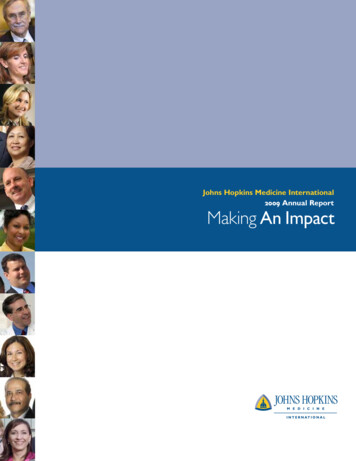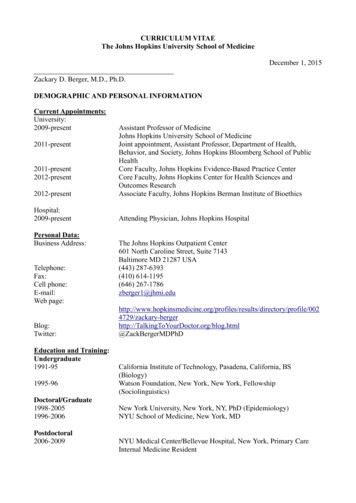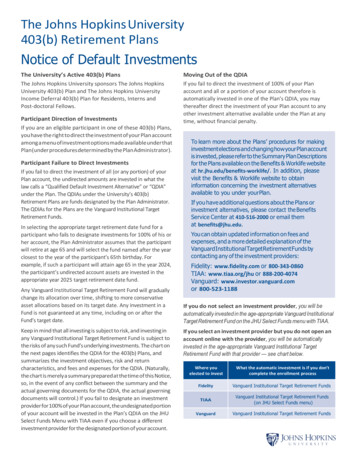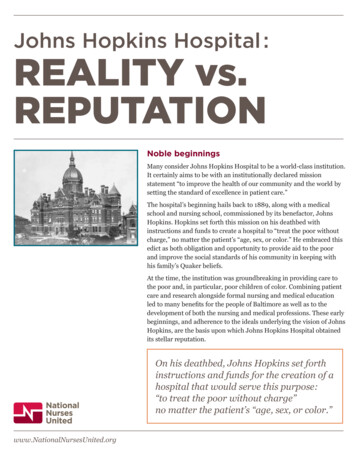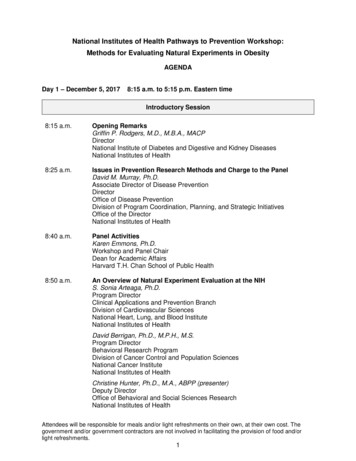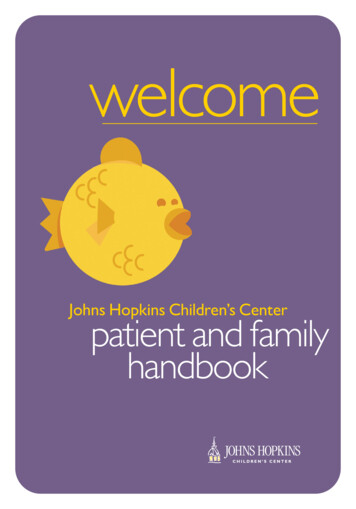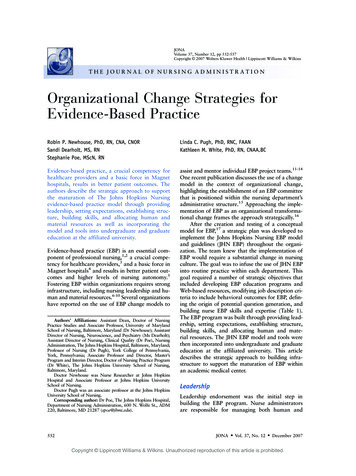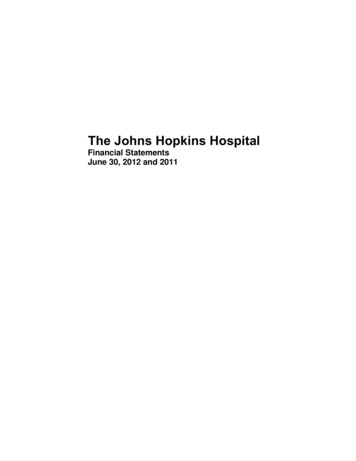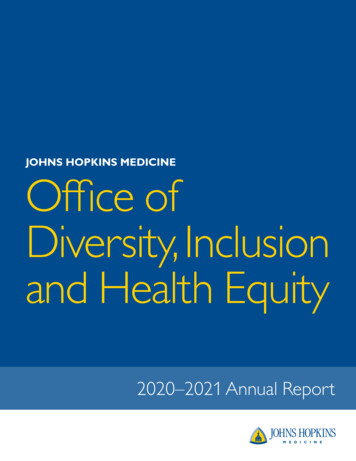
Transcription
JOHNS HOPKINS MEDICINEOffice ofDiversity, Inclusionand Health Equity2020–2021 Annual Report
PEOPLEJohns Hopkins Medicine Office of Diversity, Inclusion and Health EquitySherita Golden, M.D.,M.H.S.Vice President, ChiefDiversity OfficerJohns Hopkins MedicineOffice of Diversity,Inclusion and HealthEquityTamala KnoxExecutive AssistantTracey KirbySenior AdministrativeCoordinatorDione PowellHuman ResourcesNot PicturedJack BrossartFinanceShari Lawson, M.D.,M.B.A.Assistant Dean forMedical Student DiversityShellon Johnson,M.P.A., M.B.AProgram Manager forDiversity and InclusionDyesheena BrownProgram CoordinatorJohns Hopkins University School of MedicineRobert Higgins, M.D.,M.H.S.A.*Until 12/1/2021Senior Associate Deanfor Diversity andInclusionCo-Chair of the Schoolof Medicine DiversityCouncilDamani Piggott, M.D.,Ph.D.*Until 6/30/2021Assistant Dean forGraduate StudentDiversityTHE MISSION OF THE JOHNS HOPKINS MEDICINE OFFICE OF DIVERSITY,INCLUSION AND HEALTH EQUITY IS:To provide content expertise and programmatic support to institutional leadership and humanresources to recruit, promote, retain and engage those underrepresented in medicine, science,nursing and health care administration so that we can achieve health equity for the mostvulnerable populations.2 Office of Diversity, Inclusion and Health Equity 2020–2021 Annual Report
Johns Hopkins Medicine/Johns Hopkins Health SystemTraining and CultureKaren Jones, M.A.*Until 6/30/2021Director ofDiversity andInclusionCheri Wilson,M.A., M.H.S.,C.P.H.Q.Program Manager,Diversity andInclusion Trainingand EducationJennifer Reeves,R.N., M.B.A.Diversityand InclusionConsultant,National CapitalRegionApril Lugo*Until 9/24/2021Program Specialist,Johns HopkinsHealth SystemDiversity, Inclusionand Health EquityRohit Toteja,M.H.A., M.Sc.Senior BusinessIntelligence AnalystPaula Neira, J.D.,M.S.N.Clinical DirectorCenter forTransgender HealthDirector of LGBTQProgramsRisha Irvin, M.D.,M.P.H.Health EquityCommunity AffairsRachel JohnsonThornton, M.D.,Ph.D.Office of PopulationHealthJohns Hopkins University School of Medicine and Health SystemHealth EquityFelicia Hill-Briggs,Ph.D., A.B.P.P.*Until 6/14/2021Health Equity SeniorLeadCo-Chair, JohnsHopkins MedicineHealth EquityAdvisory CommitteePanagisGaliatsatos, M.D.,M.H.S.Faculty HealthEquity Co-LeadChair of the JHHSHealth EquitySteering CommitteeKathleen Page,M.D.Latinx Health EquityChampionBonnie Swenor,Ph.D., M.P.H.Disability HealthEquity ChampionVISION:We envision a Johns Hopkins Medicine where diversity, equity and inclusion are in our DNA,and where together we commit to: Embracing and celebrating our differences Educating and developing our staff and learners Engaging in equitable health care delivery and workforce practicesOffice of Diversity, Inclusion and Health Equity 2020–2021 Annual Report 3
Welcomefrom Dr. Sherita Golden/VP and Chief Diversity OfficerWelcome to the Johns Hopkins Medicine Office ofDiversity, Inclusion, and Health Equity. It is an honorand privilege for me to serve as the JHM ChiefDiversity Officer. A diversified workforce is crucial toachieving health equity, enhancing scientific discovery and strengtheningties to our surrounding communities. JHM needs a diverse and engagedworkforce because this is a key hallmark of successful organizations andthe diverse mix of staff, faculty and neighborhoods that have a stakein JHM necessitate a vision and structure for diversity, inclusion andengagement. We all have different roles in patient care — for example,we are physicians, nurses, pharmacists, allied health professionals,administrators, meal delivery and environmental services workers. Weeach come from different places, and arrived by way of a unique journeyto Johns Hopkins; these differences likely contributed to shaping us,and inspire our reactions and perspectives regarding today’s socialand health care issues. The better we appreciate and understand ourindividual perspectives, the more cohesive and engaged our teams willbe, which will result in more equitable health care delivery. A cultureof diversity and inclusion in health care, unlike in other industries,is a matter of life and death. If we don’t address our biases andassumptions, it can affect our decision-making in a way that ultimatelyharms a patient.Sherita Golden, M.D., M.H.S.We are at a critical crossroads in our institution’s history. We are in themidst of the COVID-19 pandemic that is disproportionately impactingBlack, Hispanic/Latinx and Native American communities. We are alsoin the midst of a national social justice movement, forcing us again toconfront our nation’s racial history.Amid all of the past year’s challenges, JHM has been resilient —launching its first comprehensive Diversity, Inclusion, and HealthKevin SowersInez StewartEquity Strategic Plan. We have increased our transparency and openedimportant dialogues around race/ethnicity, inclusion and diversity;begun training our managerial leadership in bias mitigation strategiesand allyship; launched a structural racism Journeys in Healing town hall series; launched new Employee Resource Groups;and supported COVID-19 vaccine equity and education efforts for our employees and community members. KevinSowers, president of the Johns Hopkins Health System and executive vice president of Johns Hopkins Medicine, and InezStewart, senior vice president of human resources for Johns Hopkins Medicine, have championed all of these efforts andtheir support has been crucial.Just as we have been international leaders in biomedical discovery, health care delivery and medical education, we want toalso become a world leader in diversity and inclusion excellence.4 Office of Diversity, Inclusion and Health Equity 2020–2021 Annual Report
DIVERSITY,INCLUSION AND HEALTH EQUITYDiversity and Inclusion Roadmap (2020-2023)MISSION:To provide content expertise and programmatic suppor t toinstitutional leadership and HR to recruit, promote, retain,and engage those underrepresented in medicine, science,nursing, and healthcare administration so that we canachieve health equity for the most vulnerable populationsVISION:We envision a Johns Hopkins Medicine where diversity, equity, andinclusion are in our DNA, and where together we commit to:nEmbracing and celebrating our differencesnEducating and developing our staff and learnersnEngaging in equitable healthcare delivery and workforce practicesnBuild AdditionalInfrastructure toSupport Worknn2020nModel OurCommitment throughWorkforce DiversityRecruitment &RetentionnHardwire OurSystems to EnsureAccountability &TransparencyJHM Diversity andInclusion LeadershipAdvisory CouncilSchool of Medicine(SOM) SteeringCommitteennNational Capital Region(NCR) Diversity andInclusion LiaisonData Business AnalystnnnExecutive JHM, JHHS and SOM leadership recruitmentnCareer development programs to support advancement and promotionnnData-drivenbenchmarks anddecision-makinginformed by D&IdashboardHealth system andentity-level D&Istrategic plansEquity reviewof policies andpracticesROADMAPDeliverEquitable HealthCare & Restorethe Trust with OurCommunitiesSystemwideunconsciousbias trainingRacial andrestorative justicedialoguesIDARE curriculum(Inclusion, Diversity,Anti-Racism, Equity)nnnCreate aCulture to SupportInclusion & Belonging& Restore Trustwith Staff2023Accurate patientdemographic data capture(REaL, SOGI, Disability)Health equity frameworksfor vulnerable populationsPartner with ArmstrongInstitute and PopulationHealthDiverse employee engagement and support — expansion of systemwideemployee resource groups (ERGs)nSupport recruitment of diverse learners and traineesnHolistic mentoring networks for diverse learners, trainees and facultyOffice of Diversity, Inclusion and Health Equity 2020–2021 Annual Report 52023
Model Our Commitment Through Workforce Diversity Recruitment and RetentionDiverse Hires andAppointments in 2020Agent of ChangeRobert Higgins,M.D., M.H.S.A.Robert Higgins, who is surgeon-in-chief at The JohnsHopkins Hospital and director of the Departmentof Surgery — the first Black physician to chair anydepartment in the School of Medicine —was appointedsenior associate dean for diversity and inclusion for theJohns Hopkins University School of Medicine in July2020. The appointment formalizes his role as an agentof change in making Johns Hopkins a more open andwelcoming institution for all School of Medicine faculty,staff, trainees and students.Higgins says it’s the responsibility of those who are well-represented inmedicine as well as those who are underrepresented to create a more diverseand equitable multicultural environment.Since joining the Department of Surgery in 2015, Higgins has hired 61 facultymembers, nine of whom are underrepresented in medicine (UiM). He hasalso hired 22 women surgeons. Three women were appointed as divisionchiefs, a rare precedent in the Johns Hopkins Department of Surgery. (Thedepartment has a total of 125 faculty members).Working in conjunction with Sherita Golden, chief diversity officer ofJohns Hopkins Medicine, Higgins is on a journey to grow the numbers of UiMand female faculty to make all departments in the School of Medicine moreequitable and inclusive by improving student and faculty recruitment; facultyretention and development; and multicultural sensitivity programming such asunconscious bias training.On December 1, 2021, Higgins will become the president of Brigham andWomen’s Hospital and executive vice president at Mass General Brigham, inBoston.6 Office of Diversity, Inclusion and Health Equity 2020–2021 Annual ReportAPPOINTMENTS:2020Neil Duke wasappointed chieflegal counsel forEmployee Affairsand AccessibilityCoordination.Immediately priorto joining the health system andover the course of his 20-plusyears of private practice, Dukespecialized in handling complexcivil jury trials and advised oncomplex workplace issues at aBaltimore law firm.Marketa Wills,M.D., M.B.A.,was appointedchief medicalofficer of JohnsHopkins HealthCare. She mostrecently served as senior medicaldirector for WellCare HealthPlans.
Model Our Commitment Through Workforce Diversity Recruitment and RetentionAn Advocate and ExampleAPPOINTMENTS:2020Namandjé Bumpus’ turbochargedcareer trajectory has taken her to historymaking heights, as the new director ofthe Department of Pharmacology andMolecular Sciences for the Johns HopkinsUniversity School of Medicine.The promotion, announced May 13,2021, makes Bumpus, 39, the first AfricanNamandjé Bumpus,American woman to lead a departmentPh.D.at the Johns Hopkins University School ofMedicine and the only African American woman currently chairinga pharmacology department at any medical school in the nation.“Being an African American woman in science, I had not only theglass ceiling, but the solitude of often being first,” she says. “One ofthe reasons I push and work so hard for these leadership roles is Ifeel like I need to be there as an advocate, and I need to be thereas an example.”Bumpus joined Johns Hopkins in 2010 as assistant professor in theDivision of Clinical Pharmacology. From 2015 to 2017, she was theschool’s first associate dean for Institutional and Student Equity, arole with particular resonance for her.“That was a graduate student mentoring job with a focus ondiversity,” she says. “I wound up being a person that a lot ofgraduate students came to talk to. Luckily, the school gave me theopportunity to do it formally. I had that role for two years and metone-on-one with 450 graduate students from across the universityto give them a safe space to talk about their lives and careers.”She became associate professor in 2015 and associate dean forbasic research in 2018. In addition to her role as departmentdirector, she holds the E.K. Marshall and Thomas H. MarenProfessorship in Pharmacology.Rachel JohnsonThornton, M.D. ’04,(housestaff, pediatrics, 2007;fellow, pediatrics, 2009)was appointed the inauguralexecutive director of clinicalservices in the newly createdOffice of Population Health. She is a practicingprimary care pediatrician at the JohnsHopkins Bayview Medical Center Children’sMedical Practice.Teodoro Norman,M.P.A., was appointedexecutive administrator ofthe Office of PopulationHealth. Norman waspreviously the associate vicepresident of Medicaid ClinicalOperations at the University of PittsburghMedical Center Health Plan.April Taylor, M.H.A,M.S., F.A.C.H.E., wasnamed vice president forquality and safety for TheJohns Hopkins Hospital.She most recently served assenior director of processimprovement and project management atChildren’s Hospital of Philadelphia.Office of Diversity, Inclusion and Health Equity 2020–2021 Annual Report 7
Model Our Commitment Through Workforce Diversity Recruitment and RetentionDiverse Hires andAppointments in 2021Helping Medical Students toThriveto Support WorkJohns HopkinsHealth System:Goals AttainedLimitations on duty hours during residency beganto take effect as Katherine C. Chretien ’00 wasfinishing her Osler residency at Johns Hopkins in2003. In the ensuing years, she witnessed a growingemphasis on work-life balance for medical studentsand trainees.In her new role at the Johns Hopkins UniversitySchool of Medicine, she has been charged withstrengthening such efforts.Build Additional InfrastructureFall 2020Katherine Chretien, M.D“Today, we’re much more attuned to wellness inmedical education and have realized, as a profession, that we ignored that fora long time. We’re understanding how important it is to care for ourselvesand how that translates into the best care of patients,” says Chretien, whoon July 1, 2021, began work as associate dean for medical student affairs anddirector of medical student wellness.Chretien spent 18 years on the faculty of George Washington UniversitySchool of Medicine and Health Sciences, most recently as associate dean ofstudents. In her new role, she aims to help Johns Hopkins medical studentsto thrive. She plans to assess their needs and then implement programs toaddress the gaps. Her vision is for Johns Hopkins trainees to become “notjust clinically excellent, compassionate physicians and future leaders, butbalanced people who will lead deeply fulfilling lives in medicine.”APPOINTMENTS: 2021Launch of the School ofMedicine Faculty DiversityCouncil and Student DiversityCouncils.The Staff Diversity Council isplanned to launch in October2021, which will be followed bythe establishment of the Schoolof Medicine Diversity andInclusion Steering Committee.May 10, 2021Jennifer Reeves, B.S.N.M.Sc., National CapitalRegion Diversity & Inclusionconsultant, began work.May 18, 2021The Johns Hopkins MedicineDiversity and InclusionLeadership AdvisoryCommittee launched with itsfirst meeting.Carol Duhaney(not pictured)has been namedexecutive directorof Revenue CycleHospital SiteOperations.Ernno Jeannot wasappointed Executivedirector of PatientFinancial Services atJohns Hopkins AllChildren’s Hospital inFlorida.Fred Owusu,J.D., M.H.A., wasappointed executivedirector of HumanResources at SibleyMemorial Hospital.8 Office of Diversity, Inclusion and Health Equity 2020–2021 Annual ReportJune 1, 2021Senior business intelligenceanalyst Rohit Tojeta, MSc,M.H.A., began work.
Model Our Commitment Through Workforce Diversity Recruitment and RetentionA New Leader at SuburbanHospitalJessica Melton, M.H.A., joined Suburban Hospitalas president and chief operating officer on April 15,2021. Melton has oversight of Suburban Hospital’sportfolio of inpatient and ambulatory services as wellas development of high quality, cost-effective andintegrated clinical programs throughout the region.She also leads Suburban Hospital’s quality and safetyprograms and financial initiatives.APPOINTMENTS:2021Dione Powellwas appointed vicepresident for Employeeand Labor Relations,Human Resources,for the Johns HopkinsHealth System.Jessica Melton“Suburban Hospital has an amazing team of physicians and staff members,and an outstanding reputation for delivering some of the most advanced andcompassionate patient care to its community,” says Melton. “I look forward torolling up my sleeves and getting to work at this exciting time in the hospital’sstrategic regional growth.”She joins Suburban Hospital from Sentara Norfolk General Hospital in Norfolk,Virginia, where she was the chief operating officer. Before arriving at Sentara,Melton held leadership roles at Duke University Hospital in Durham, NorthCarolina, including vice president of medical, surgical and critical care services;vice president of emergency services and patient flow; administrative directorof emergency preparedness and trauma; and director of the Duke Preparednessand Response Center.Angelo Mojica,Ph.D., M.P.H.,was appointed vicepresident for JohnsHopkins MedicineFood and CulinaryServices.Gary Richberg,R.N., M.S.N., M.B.A,was appointed seniordirector of nursingfor the AmbulatorySurgery Center series.Build Additional Infrastructure to Support WorkJohns Hopkins Health System: Goals AttainedExpanding Employee ResourceGroups: LGBTQ and Allies were launched;Active interest groups include Employeeswith Disabilities and their Allies, and PacificIslanders and their Allies.Career Development Programs: TheJohns Hopkins Medicine Levi WatkinsLeadership Fellowship will launch inSeptember 2021.Levi WatkinsOffice of Diversity, Inclusion and Health Equity 2020–2021 Annual Report 9
Model Our Commitment Through Workforce Diversity Recruitment and RetentionResidency Recruitment and RetentionMedicaltrainees,studentsand facultymembersdemonstratedtheir supportfor equality andracial justiceat a June 5,2020, rallyoutside TheJohns HopkinsHospital.In July 2021, 21% of the incoming intern class membersat The Johns Hopkins Hospital are from backgroundsunderrepresented in medicine.This is an increase from 16% in 2020 and 14% in 2019.I N I T I AT I V E S I N 2 0 2 0 - 2 0 2 1 Launched training to recognize and interrupt implicitbias in the trainee recruitment process for residencyand fellowship directors. Provided implicit bias training for Graduate MedicalEducation Committee members. Established expertise in allyship training. Offered a (virtual) clinical elective in EquitableHealthcare for visiting medical students. Hosted virtual “First Look” and “Second Look”outreach programs for residency candidates who areunderrepresented in medicine.‘ I F Y O U C A N ’ T S E E I T,YO U C A N ’ T B E C O M E I T ’“It’s really important for us to makesure that our population of doctorsmirrors the population of the world,”says Thomas Elliott, a third-yearpediatric resident at The JohnsHopkins Hospital, who served on aThomas Elliott“First Look” panel for prospectivetrainees.“We know from many, many studies that being a Blackdoctor and going into communities is so helpful becausewe have the perspective and the understanding of whatthose communities look like, and the trials and tribulationsthat they go through, and the supports and the great thingsthere are about those communities that we can leverage todo medicine.”Adds Elliott, who was chair of the House Staff DiversityCouncil, “There’s definitely a lot of doubt in being aBlack doctor in medicine and trying to become a doctor,especially coming from places in which you have neverseen one before. If you can’t see it you can’t become it. Myvision for the future is that the number of Black doctors inmedicine mirrors the country’s population.”10 Office of Diversity, Inclusion and Health Equity 2020–2021 Annual Report
Model Our Commitment Through Workforce Diversity Recruitment and RetentionClosing the GapsIn June 2020, physician-scientistDamani Piggott, M.D., Ph.D.,launched the Leadership DevelopmentAlumni Network for Minority PhDs,with funding from Johns HopkinsUniversity’s PhD ProfessionalDevelopment Innovation Initiative.The project will launch an expansivenetwork of alumni and PhD studentswho come from backgrounds that aretraditionally underrepresented in thebiomedical workforce. By matchingstudents with alumni who share similarbackgrounds and life experiences,Piggott and his team hope to showbudding scientists and doctors thatthere is a place for them in theprofessional fields of medicine andbiology, and that their points of vieware critical to protecting health for allhumans.“There are groups of peoplewho have been historically andcontemporaneously underrepresentedin science, medicine, public health,nursing, and other fields because ofgaps in opportunity and access toeducation,” says Piggott, the assistantdean for graduate biomedical educationand graduate student diversity at theJohns Hopkins University School ofMedicine.“That underrepresentation preventsus as a society from leveraging thefull expanse of our human talent, tothe detriment of the health of ourcommunities. It’s critical to close thosegaps and provide positive and affirmingmentorship that is sensitive to diversehistories and legacies in our space.”"It’s critical toclose gaps andprovide positiveand affirmingmentorship thatis sensitive todiverse historiesand legacies inour space.”—DAMANI PIGGOTTHardwire Our Systems to Ensure Accountability and TransparencyJohns Hopkins University School of Medicineand Johns Hopkins Health System: Goals Develop John Hopkins Medicine Diversity & Inclusion dashboard to track metrics by race/ethnicity and sex: In process Policy equity review: Ongoing Develop benchmarks to diversify leadership: OngoingOffice of Diversity, Inclusion and Health Equity 2020–2021 Annual Report 11
Create a Culture to Support Inclusion & Belonging & Restore Trust with StaffTransformational Training:Step In, Step Up“This is a defining time inmedicine. It needs to be our goalthat the culture of medicine is onethat promotes both professionalequity and health equity.”While COVID-19 has been a keyfactor influencing medical educationin 2020-2021, it has not been theonly one. The summer of 2020was also defined by nationwideprotests following killings by policeof unarmed Black men and women,including George Floyd and BreonnaTaylor. At the same time, Black,Latinx, and Indigenous people weredisproportionately harmed byCOVID-19.The Johns Hopkins University Schoolof Medicine has long addressed issuesof race and equity in its curriculum.In 2020–2021, it undertook efforts tohelp learners and employees addressunconscious bias and recognizestructural racism in the treatmentof patients and in interactions withcolleagues.The goal: to remove barriers thatkeep people in Johns Hopkins andthe surrounding communities fromachieving their full health and careerpotential.“We need to start by understandingthat we all have biases and recognizingracism in all of its forms,” saysSherita Golden, vice presidentand chief diversity officer for JohnsHopkins Medicine. Her officecollaborated with the Johns Hopkins—Jessica Bienstock, M.D., M.P.H.Associate Dean for Graduate Medical EducationUniversity Office of Diversity andInclusion and Partners for RacialEquity LLC consulting to develop aseries of town halls about structuralracism, particularly how it manifestsitself in health care and the workplace.Partners for Racial Equity alsosupported Johns Hopkins Medicine inscaling its diversity train-the-trainerprogram.A third component, bystanderintervention training, will help peopleconfront racism as it is happening.For example, patients sometimes saydisparaging things about the clinicianscaring for them.“If a patient says somethinginappropriate to staff,” Golden says,“it’s important for the supervisor orpeer standing by to speak up, to say, ‘I12 Office of Diversity, Inclusion and Health Equity 2020–2021 Annual Reportwould trust this nurse with a memberof my family.’ We will teach peoplehow to do that, give them the tools.”Says Jessica Bienstock, associatedean for graduate medical education,“The damage done to a trainee whena faculty member says nothing istremendous. It causes permanentscarring that can influence theirconfidence and careers. The [new]workshops show faculty membershow to step in and step up.”She welcomes the expansion tostudents and trainees. “This is adefining time in medicine,” she says. “Itneeds to be our goal that the cultureof medicine is one that promotes bothprofessional equity and health equity.”
Create a Culture to Support Inclusion & Belonging & Restore Trust with StaffJohns Hopkins University Schoolof Medicine and Johns HopkinsHealth System: Goals AchievedFebruary 2020 Developed and launched unconscious bias train-thetrainer program. Certified two cohorts of Johns Hopkins Health Systemand School of Medicine staff and faculty — 28 trainersacross Johns Hopkins Medicine who were coached anddeployed for unconscious bias and IDARE (inclusion,diversity, anti-racism, and equity) training.June/July 2020 Conducted Racial Listening Session Trainings(5 Zoom Webinars, June 30 thru July 8, 2020 attendedby 1,257 managers, leaders, and faculty.)November 2020KatrinaCaldwell, Ph.D. Launched Journeys in HealingStructural Racism Town HallSeries, in collaboration withPartners for Racial Equity, ledby Kim D’Abreu, and KatrinaCaldwell, Johns HopkinsUniversity’s vice provost fordiversity and inclusion.February 2021 Implemented unconscious bias training for JohnsHopkins Health System, School of Medicine, and JohnsHopkins Medicine leadership (managers and above).Training for School of Medicine learners will launch in2022.Office of Diversity, Inclusion and Health Equity 2020–2021 Annual Report 13
Deliver Equitable Health Care and Restore Trust with Our CommunitiesData Infrastructure forHealth EquityDelivering equitable health care for vulnerable populations requires the development of aninfrastructure for accurate and consistent capture of patient data in Epic across the JohnsHopkins Health System.Senior business intelligence analyst Rohit Tojeta was appointed to guide those efforts,which involve partnering with the Office of Population Health and the ArmstrongInstitute for Patient Safety and Quality to establish a data strategy with regard to patientdemographics and social determinants of health.A number of training initiatives were completed and partnerships were established in2020-2021. Notably: REaL Training: Throughout theSpring of 2020, the Office of Diversity,Inclusion and Health Equity led“Collecting Patient SociodemographicData” training. Some 363 staff members— working in the COVID-19 Call Center, Patient Access, and the JohnsHopkins Community Physicians CallCenter — received training through 17,two-hour-long live Zoom sessions.COVID-19 Health EquityPartnerships: The Johns HopkinsMedicine Allocation of Scarce ResourcesCommittee facilitated unconsciousbias training for Triage and SecondaryReview Teams, and oversaw literacyadapted patient handouts for varioustriage and review scenarios.COVID-19 Health EquityPartnerships: Johns Hopkins MedicineLanguage Services launched Juntosin April 2020 — a team of volunteerbilingual clinicians to facilitate complexcommunications with patients andfamilies, performing more than 200consults.14 Office of Diversity, Inclusion and Health Equity 2020–2021 Annual ReportKathleen PageAssociate Professor ofMedicine; Co-Director,Centro SOLTina TolsonSenior Directorof Operations forLanguage Services
Deliver Equitable Health Care and Restore Trust with Our Communitiesedo“Pero no pupagarla.”JUOS CONTR ANTJuntos contraCOVID-19“Estamanzana nome sabe anada.”DELA PRUEBA¡HÁGASECOVID -19!¡ES GR ATIS!salgo“¿Qué pasa sipositiva? No alrtafalpuedotrabajo.”“No quierodar minombre.”SABAJO MÁLVER AL TRITARÁ¡PODR Á VO SCANSA Y ASÍ EVDERÁPIDO SI A LOS DEMÁS!IARAGCONTDAMORA QUE POES SOLO PA DOS.LTALOS RESUS LLAMARLEto“El aislamienme resultaimposible.”OJARSE¡PUEDE AL TE EN ELENGR ATUITAM BALTIMORE!RDHOTEL LO 443-984-8915.ALMELLAY DARLE“El hospitalme damiedo.”“Está bien. ¿Aodónde tengque ir?”URO!TAL ES SEG Y¡EL HOSPIESPAÑOLHABLAMOS EMOS LAMANTENDE SUADCIDPRIVAEREMOSCIÓN. ¡QUINFORMAJORE!QUE SE MELlame alnterEsperanza Ce .14al �Proteje a tu familia con una prueba GRATUITAy ted-covid-19-baltimore-cityEsperanza Center: 667-600-2314Johns Hopkins Medicine (español): 443-997-9537A poster series aims to help connect Latinx patients andtheir families to health services at Johns Hopkins.Juntos: Culturally Appropriate CareA new program called Juntos seeks to reduce cultural andlanguage isolation for Latinx patients and their families byconnecting them with bilingual clinicians. “Having someonespeak to the patients directly in their primary languageis comforting,” says Tina Tolson, senior director ofoperations for Johns Hopkins Medicine Language Services.Tolson created Juntos with Kathleen Page, associateprofessor of medicine; Centro SOL (Center for Salud/Health & Opportunities for Latinos) and the Office ofDiversity, Inclusion and Health Equity.ascertain more information directly from the patient topromote healing and ensure understanding of a complexclinical situation,” she says.Talia Robledo-Gil, an internal medicine-urban healthresident, is one of about a dozen Juntos volunteerswho talk with patients and family members, sometimesanswering questions and sometimes simply easing theirisolation and fears. “With really critically ill patients, it canmean explaining to their loved ones why they need to beintubated, even though they seemed fine yesterday,” saysThe service does not replace medical interpretation, Tolson Robledo-Gil, who grew up in a bilingual, bicultural Miamisays, but offers additional support for this vulnerablehome with parents born in Peru.population. “The Juntos providers are often able toOffice of Diversity, Inclusion and Health Equity 2020–2021 Annual Report 15
Deliver Equitable Health Care and Restore Trust with Our CommunitiesMembers of the COVID-19 Pandemic Anchor Strategy Work Group, left to right: Nicole McCann, Tina Tolson,Sherita Golden, Panagis Galiatsatos, Alicia WilsonAn Anchor StrategyAlicia WilsonIn March 2020, as Th
Human Resources Not Pictured Jack Brossart Finance Johns Hopkins University School of Medicine Robert Higgins, M.D., M.H.S.A. *Until 12/1/2021 Senior Associate Dean for Diversity and Inclusion Co-Chair of the School of Medicine Diversity Council Damani Piggott, M.D., Ph.D. *Until 6/30/2021 Assistant Dean for Graduate Student Diversity Shari .
